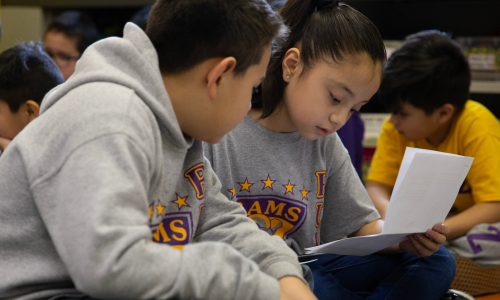
I love this time of year, when the internet is flooded with best-of lists. The best movies. The best books. The best gadgets, even. It’s such a clever way to encapsulate a period of time, to whittle it down to the things that stood out and to celebrate excellence. But who decides what makes the cut? At Teach. Learn. Grow., you do.
Here are 10 posts that spoke to our readers this year. We hope they’ve helped you feel supported in your work and that you’ll visit us again in 2024.
On helping kids with reading and writing
I remember reading to my son when he was just a few days old. I propped him against my chest and balanced Little Blue Truck on my thighs. His eyes were still learning how to make sense of the world around him, but I like to think he enjoyed it.
He’s in second grade now, and we still don’t let a bedtime come and go without at least a little reading time together. Sometimes, we each grab a book and booklight and read side by side in the dark. Mostly, I read to him with a proper lamp on, and we haggle over the number of pages we have time for.
In 2023, we saw many Teach. Learn. Grow. readers come to us for guidance on literacy, both in the classroom and at home. Here are our two most popular posts on reading and writing in 2023:
- “The science of reading explained”
- “Parent strategies for improving their child’s reading and writing”
On supporting students well
This year saw the first teacher strike in the history of Portland Public Schools in Oregon, where I live. For 26 days, we wondered when our kids would go back to school. And for 26 days, I worried, because when district leadership prepared for a strike in late October, I received an email that my kindergartener’s MAP® Reading Fluency™ scores showed cause for concern. She was offered online reading coaching for the duration of the strike, and I felt grateful for the support.
School is back in session, and it’s too soon to know if my daughter will continue to need extra help in the coming months or even years. But I do know that I feel well equipped to advocate for her thanks to the new MAP Reading Fluency with Coach feature and this popular post on individual education plans (IEPs):
On assessment
Before I became a parent, I taught college writing. I miss it sometimes, but I never miss the grading. It wasn’t the hours it took to barely make a dent in a pile of essays that I dreaded; it was that assessment is infinitely difficult. I was always awash in nagging questions: Was there more I could have done to help this student or that student better understand the content so they could earn a higher grade? Was a big batch of As proof that the material I was teaching was too easy?
It’s no surprise that the following Teach. Learn. Grow. posts on assessments—both interim (with MAP® Growth™) and ungraded formative assessments—helped many of our readers this year:
- “12 common questions parents ask about MAP Growth”
- “Six commonly used MAP Growth terms worth knowing”
- “Sharing assessment data with parents just got simpler”
- “What is formative assessment?”
- “75 digital tools and apps teachers can use to support formative assessment in the classroom”
- “27 easy formative assessment strategies for gathering evidence of student learning”
- “Three ways to put assessment data to work in the classroom”
Warm wishes for the new year
January is a milestone, a time to stop and reflect on how the school year has gone so far and where you’d like to take your students in the months you have left together. All of us at Teach. Learn. Grow. hope the rest of this school year is filled with learning, joy, and laughter. And time for catching your breath, too. You’ve definitely earned it.







